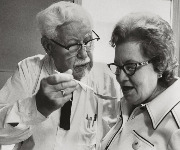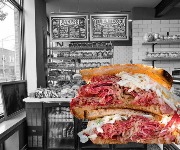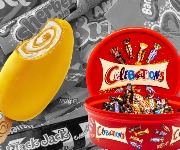Why we shouldn't have warning labels on booze

A Parliamentary group has called for warning labels on alcoholic drinks, but Matt Brady argues that it's not a good idea.
Following the news back in May that campaigners were calling for warning labels on fatty foods as part of their 2015 manifesto, the All Party Parliamentary Group on Alcohol Misuse has suggested that alcoholic drinks need the same treatment.
Among their other proposals are some really sensible suggestions, such as reducing the blood alcohol limit to 50mg/100ml for drivers or increasing funding for treatment to help problem drinkers stop consuming alcohol.
But I really can’t see the benefits in ‘warning’ labels. Let me explain why.
A drinking culture
It’s no secret that alcohol consumption is widespread throughout the UK, but it’s also no secret that alcohol is a poison, that it can cause ill health, and that it can cause damage to internal organs. But note the conditional. It can cause those things, but in the vast majority of people it doesn’t, because they are in control of their drinking.
I won’t deny that problems exist, and it would be irresponsible and wrong of me to do so, as it would be for me to say that alcohol is harmless. I also think that, as the report states, more should be done to make people aware that alcohol is a “carcinogen linked to more than 60 different health conditions” through a public campaign.
But I would argue that warning labels and minimum pricing just don't figure in any sensible solution.
Minimum unit pricing?
“With a three-litre bottle of cider currently cheaper than a ticket to the cinema,” trumpets the report, “one in five children who drink now consume 15 or more units per week.” I think it's a fairly cheap argument from the Group to imply in this manner that there's some kind of causal link between alcohol being available cheaply, and children drinking it. “Cider is so cheap in the UK, that even children are guzzling it like they were The Wurzels!”
I think the facts here reflect more on the exorbitant price of going to see a film, and the lack of affordable activities available to children in the UK. Maybe we could work on that, and on encouraging mature attitudes among children towards alcohol, so that they don't want it, rather than suggesting that we should price alcohol so that they can't afford it?
I just looked up the cost of cinema tickets: to see the film Guardians of the Galaxy (in 2D, the 3D ticket is even more), it's £7.55 for a child. Oh, and add the fact that as soon as you’re 13 you’re classed as an ‘adult’ (hardly fair) and it then costs £10.30 a pop. Do kids really have the money for that?
But enough of complaining about cinema prices, as I hope you’ve got my point: comparing the price of booze to a cinema ticket isn’t a good example to set behind a minimum pricing argument. Because I would expect to get a substantial amount of cider for a tenner.
Regulate the marketing
So why not just go with strengthening the regulation of alcohol marketing? That’s another of the Group's suggestions. There already is a set of rules in place, but the body who wrote them apparently doesn't have all that many powers.
In fact, the first rule in the Committee of Advertising Practice’s list reads: "Marketing communications must be socially responsible and must contain nothing that is likely to lead people to adopt styles of drinking that are unwise.
"For example, they should not encourage excessive drinking. Care should be taken not to exploit the young, the immature or those who are mentally or socially vulnerable."
So the trick here, says the report, is to tighten those rules and give advertising standards bodies the power to punish advertisers who don’t toe the lie. Sounds good to me.
So if those powers were put into place, and a good education programme about the dangers of alcohol was implemented – albeit including an acknowledgement of its place at social events and an acceptance of sensible consumption – where does the need for warning labels come in?
An alternative to a warning…
If you’re going to slap a sticker on a pack, why not make it constructive? Instead of a warning label, which I imagine would read something along the lines of “alcohol causes liver damage", why not have some helpful information, like a support line or related NHS number for those who really do have an issue?
Wouldn’t that be better than just reminding problem drinkers that they’re on the path to self-destruction?
Smoking overall has continued to fall since warnings first appeared in 1971, and the labels’ size and prominence continued to increase, culminating in the placement of picture warnings from 2009 onwards.
Do I really want to look into the fridge and be reminded of my impending doom by a picture of liver cirrhosis just because I’m having a second can of beer on a Friday night? No, and especially not while consuming alcohol, since it's a depressant.
Will there be written warnings, and assorted pictures of cancerous tumours on the taps down the pub? When you order a glass of wine with your meal, will the waiter be obliged to quietly remind you that you're ordering a glass of pain and suffering? Or will they imprint a message on the bottom of beer glasses, that tells you all about the harm that you've just done to your body when you get to the end of your drink?
Of course not. The entire hospitality industry would go out of business.
We need to help people who are dependent on alcohol, and we do need deterrents to stop people falling into over-reliance and addiction.
But why not take the huge amount money that would doubtlessly be spent on developing and producing warning labels (and the cost of the inevitable alterations over time), and use it to fund services to help those dependent on alcohol and educate people about the dangers rationally, rather than forcing it down their throats every time they fancy a drink?
Do you think warning labels are neccesary for alcoholic products? Do you think they would be effective? Are they a good idea? Let us know your views in the Comments below.
You might also like:
Best low-alcohol and alcohol-free beers, ciders and wines
Most Recent
Comments
Be the first to comment
Do you want to comment on this article? You need to be signed in for this feature








